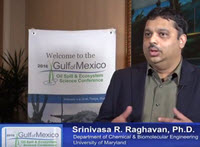The Molecular Engineering of Food-Grade Dispersants as Highly Efficient and Safe Materials for the Treatment of Oil Spills project is lead by P.I. Srinivasa R. Raghavan, University of Maryland
The goal is to engineer a new class of dispersants that combine environmental safety and high efficiency. By avoiding the synthetic components in current dispersants that are of questionable toxicity, and replacing them with food-grade components, new dispersants will be created that are nontoxic and safe for use in aquatic environments. At the same time, through an improved understanding of the fundamentals of dispersion, high dispersion efficiencies will be achieved that are comparable or higher than with current dispersants i.e., the Corexits.
The use of food-grade dispersants will enable a safer and more environment-friendly approach to the mitigation of crude oil spills, which will help avert issues of public concern regarding dispersant toxicity. Molecular-level insights into dispersant action via innovative experiments will reveal ways to enhance the efficiency of dispersion and also allow for dispersants to be optimized for a variety of complex conditions (such as dispersion of highly viscous or weathered oils).
The project will involve the following five approaches: (1) Optimizing Food-Grade Surfactant Mixtures; (2) Optimizing Solvents and the Overall Dispersant; (3) Optimize Dispersants for Different Conditions (Oil, Water, Temperature); (4) Pilot-Scale Testing; and (5) Biodegradation and Toxicity Testing.
The concept of food-grade dispersants is one of the truly promising ideas to come out of the work done under C-MEDS. This project seeks to translate the inherent idea into a practical and viable technology. Towards this end, pilot-scale testing of optimized food-grade dispersants (Approach 4) will be conducted using the indoor wave tanks at S. L. Ross Environmental Research. In addition, initial tests on bacterial biodegradation in the presence of food-grade dispersants will be studied (Approach 5). The toxicity of these dispersants to aquatic species will also be studied using commercial assays, and further aspects concerning toxicity and biological effects will be investigated together with collaborators.
Click for access to GoMRI’s YouTube videos of RFP-V Projects…
************
This project was funded by the Gulf of Mexico Research Initiative (GoMRI) in the RFP-V funding program.
The Gulf of Mexico Research Initiative (GoMRI) is a 10-year independent research program established to study the effect, and the potential associated impact, of hydrocarbon releases on the environment and public health, as well as to develop improved spill mitigation, oil detection, characterization and remediation technologies. An independent and academic 20-member Research Board makes the funding and research direction decisions to ensure the intellectual quality, effectiveness and academic independence of the GoMRI research. All research data, findings and publications will be made publicly available. The program was established through a $500 million financial commitment from BP. For more information, visit http://gulfresearchinitiative.org/.

